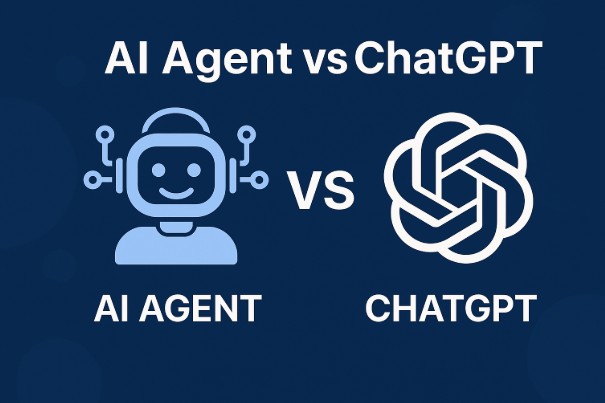Table of Contents
- 1 Introduction: Navigating the AI Landscape
- 2 What Is ChatGPT?
- 3 What Is an AI Agent?
- 4 Key Differences: AI Agent vs ChatGPT
- 5 Use Case Examples: ChatGPT vs AI Agent in Action
- 6 Technical Comparison
- 7 SEO Considerations: Which Ranks Better?
- 8 FAQs: AI Agent vs ChatGPT
- 9 External Resources
- 10 Conclusion: Which Should You Choose?
In the ever-evolving world of artificial intelligence, tools like ChatGPT and autonomous AI agents are revolutionizing how we interact with machines. These AI technologies are becoming indispensable across industries—from marketing automation and customer service to complex task execution and decision-making. However, confusion often arises when comparing AI Agent vs ChatGPT, as the terms are sometimes used interchangeably. This article will explore their core differences, applications, and how to decide which is right for your use case.
What Is ChatGPT?
A Conversational AI Model
ChatGPT is a conversational AI developed by OpenAI based on the GPT (Generative Pre-trained Transformer) architecture. It’s designed to:
- Engage in human-like dialogue
- Generate coherent responses
- Assist with tasks such as writing, researching, and coding
Key Capabilities
- Natural Language Understanding and Generation
- Multilingual Support
- Context Retention (short-term, within conversation windows)
- Plug-in and API Support for custom tasks
Ideal Use Cases
- Customer support chats
- Writing and editing tasks
- Coding assistance
- Language translation
What Is an AI Agent?
An Autonomous Problem Solver
An AI Agent is a software entity that can perceive its environment, reason about it, and take actions toward achieving goals. AI Agents are often built as part of multi-agent systems (MAS) and are more autonomous than ChatGPT.
Core Components of an AI Agent
- Perception – Gathers data from the environment
- Reasoning Engine – Analyzes and makes decisions
- Action Interface – Executes tasks or commands
- Learning Module – Adapts over time (e.g., via reinforcement learning)
Ideal Use Cases
- Task automation (e.g., booking appointments, sending emails)
- Robotics
- Intelligent tutoring systems
- Personalized recommendations
Key Differences: AI Agent vs ChatGPT
| Feature | ChatGPT | AI Agent |
|---|---|---|
| Goal | Conversational assistance | Autonomous task execution |
| Interactivity | Human-led interaction | System-led interaction |
| Memory | Limited contextual memory | May use persistent memory models |
| Adaptability | Needs prompt tuning | Can learn and adapt over time |
| Integration | API-based | API + sensor-actuator integration |
| Example | Answering a query | Scheduling meetings autonomously |
Use Case Examples: ChatGPT vs AI Agent in Action
Example 1: Customer Service
- ChatGPT: Acts as a chatbot answering FAQs.
- AI Agent: Detects customer tone, escalates issues, triggers refunds, and follows up autonomously.
Example 2: E-commerce Automation
- ChatGPT: Helps write product descriptions.
- AI Agent: Monitors inventory, updates listings, reorders stock based on sales trends.
Example 3: Healthcare Assistant
- ChatGPT: Provides information on symptoms or medication.
- AI Agent: Schedules appointments, sends reminders, handles insurance claims.
Example 4: Personal Productivity
- ChatGPT: Helps brainstorm ideas or correct grammar.
- AI Agent: Organizes your calendar, drafts emails, and prioritizes tasks based on your goals.
Technical Comparison
Architecture
- ChatGPT: Based on large language models (LLMs) like GPT-4.
- AI Agent: Can use LLMs as components but typically includes additional modules for planning, control, and memory.
Development Tools
- ChatGPT: OpenAI Playground, API, ChatGPT UI
- AI Agent: LangChain, AutoGPT, AgentGPT, Microsoft Autogen
Cost and Deployment
- ChatGPT: SaaS, subscription-based, quick to deploy
- AI Agent: May require infrastructure, integration, and training
SEO Considerations: Which Ranks Better?
When writing AI-generated content or designing intelligent applications, understanding AI Agent vs ChatGPT ensures you:
- Optimize for the right intent
- Choose the most appropriate tool
- Reduce development overhead
From an SEO perspective:
- Use ChatGPT for dynamic content generation
- Use AI Agents to automate SEO workflows, like updating sitemaps or monitoring keyword trends
FAQs: AI Agent vs ChatGPT
1. Is ChatGPT an AI agent?
No, ChatGPT is not a full AI agent. It’s a conversational model that can be embedded into agents.
2. Can AI agents use ChatGPT?
Yes. Many autonomous agents use ChatGPT or other LLMs as a core component for language understanding and generation.
3. What’s better for automation: AI Agent or ChatGPT?
AI Agents are better for autonomous, multi-step automation. ChatGPT excels in human-in-the-loop tasks.
4. Which one is easier to integrate?
ChatGPT is easier to integrate for basic needs via APIs. AI Agents require more setup and context modeling.
5. Can I create an AI agent with no-code tools?
Some platforms like FlowiseAI and Zapier with AI plugins allow low-code/no-code agent creation.
External Resources

Conclusion: Which Should You Choose?
If you need fast, flexible responses in a conversational format—ChatGPT is your go-to. However, if your use case involves decision-making, task automation, or real-time adaptation—AI Agents are the better fit.
Understanding the distinction between AI Agent vs ChatGPT not only helps you deploy the right technology but also empowers your strategy across customer experience, productivity, and innovation.
Pro Tip: Use ChatGPT as a component in a larger AI Agent system for maximum efficiency. Thank you for reading the DevopsRoles page!
